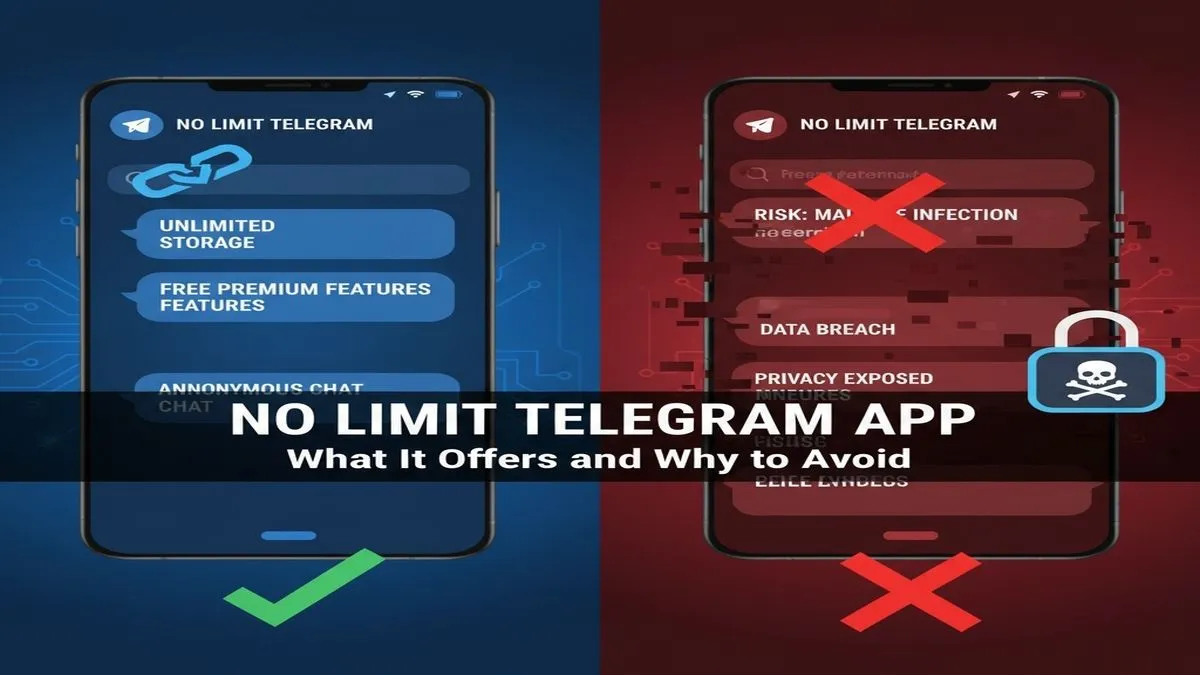Introduction
In today’s digital age, communication apps are constantly evolving to meet user demands for speed, convenience, and flexibility. Telegram, one of the world’s most popular messaging platforms, has garnered a loyal following due to its robust privacy features, encryption options, and extensive array of functions. However, as with any major platform, modified or third-party versions often emerge that promise more freedom and fewer limitations. One such example is No Limit Telegram, an unofficial, modified version of the original Telegram app.
Table of Contents
What Is No Limit Telegram?
No Limit Telegram is an unofficial, modified version of the official Telegram app. It is not developed or endorsed by Telegram’s parent company. Instead, third-party developers alter the app’s code to bypass restrictions and introduce features not available in the original platform.
Telegram’s official version prioritizes stability, user security, and compliance with its policies. In contrast, it aims to provide more freedom and control but often at the expense of security and long-term reliability.
Also Read: How Piso WiFi Pause Time Maximizes Your Internet Usage
Why Do People Use No Limit Telegram?
The popularity of unofficial apps like No Limit Telegram often stems from user frustrations with platform restrictions. People want more freedom, and mods appear to provide that. Some common motivations include:
- Business and marketing needs: Entrepreneurs may want to forward promotional messages to thousands of people without limits.
- Content sharing: Users dealing with large files, such as videos, software, or educational materials, may find the official limits restrictive.
- Community management: Larger groups and enhanced admin tools can seem useful for managing massive online communities.
But while these motivations are understandable, the risks of using unofficial apps outweigh the convenience in most cases.
Features of No Limit Telegram
It promotes itself by offering features beyond the standard app. The most common claims include:
1. Larger File Uploads
- The official Telegram app allows file uploads up to 2 GB.
- It claims to remove this restriction, enabling users to share significantly larger files without compression.
2. Bigger Groups and Channels
- While Telegram groups can host up to 200,000 members, modified versions often promote the ability to exceed these numbers.
- This can appeal to community managers, marketers, or businesses looking to expand their reach.
3. Unlimited Forwarding
- The official app places restrictions on bulk forwarding to prevent spam and misinformation.
- It removes these caps, enabling users to forward messages, media, or entire chats without limits.
Pros and Cons of No Limit Telegram
Pros
- Larger file uploads: Claims to allow files bigger than Telegram’s 2GB limit.
- Bigger groups: Promotes unlimited group size beyond the 200,000-member cap.
- Unlimited forwarding: No restrictions on mass forwarding messages.
Cons
- Privacy risks: No guarantee of encryption or data safety.
- Potential malware: High risk when downloading from unofficial sources.
- No official support: Telegram’s team cannot resolve problems.
Join No Limit Telegram Groups
Step 1: Search for No Limit Telegram Links
Searching for No Limit Telegram links usually leads to unofficial sources, third-party forums, or unverified websites. These links are unsafe, risky, and can expose users to malware, scams, or account bans.
Step 2: Check Group Rules and Features
Before joining any Telegram group, always review its rules and features to ensure you understand them. Check pinned messages, admin guidelines, posting limits, and privacy settings to ensure the group’s purpose, content, and community align with your expectations.
Step 3: Join and Participate
Join a Telegram group by tapping ‘Join’, then participate respectfully by following the rules, engaging in discussions, and sharing valuable contributions.
Risks of Using No Limit Telegram
Using modified apps like No Limit Telegram comes with serious risks that every user should carefully consider:
1. Privacy Concerns
Since No Limit Telegram is not developed or endorsed by the official Telegram team, there is no guarantee that your messages, files, or data will remain private. The app’s developers may have access to sensitive information, including contacts, personal chats, and shared media.
2. Data Leaks and Security Breaches
Unofficial apps often lack proper security audits. This makes them vulnerable to data leaks or exploitation by cybercriminals. Even if the app appears to function normally, it may store or transmit your data in unsafe ways.
3. Potential Malware
Downloading apps outside of official app stores (such as Google Play Store or Apple App Store) exposes you to the risk of malware, spyware, or trojans. These malicious programs can compromise your device, steal banking credentials, or install unwanted software.
Expert Recommendation
While No Limit Telegram may promise freedom, it comes with hidden dangers that outweigh its benefits. As a best practice:
- Always download apps from official stores.
- Do not share sensitive information on third-party apps.
- Stay updated with official versions for maximum security.
- Consider paid options if you need advanced features.
In the long run, security and privacy are worth far more than the convenience of bypassing restrictions.
FAQs
Q1. Can I get banned for using No Limit Telegram?
Yes. Telegram may suspend or restrict accounts found using modified versions.
Q2. What features does No Limit Telegram claim to offer?
Larger file uploads, bigger groups, unlimited forwarding, and customization options.
Q3. Is there a legal way to bypass Telegram’s limits?
Yes. Telegram Premium provides higher limits without violating rules.
Final Thoughts
At its core, No Limit Telegram appeals to users who want fewer restrictions and more control. However, these benefits come at a steep price: your security, privacy, and account integrity. Unlike the official Telegram app, which undergoes strict audits and offers end-to-end encryption, modified apps are risky, unsupported, and often unsafe.


